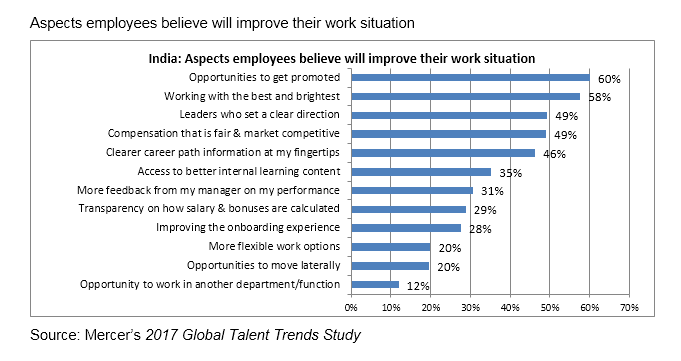



Here's a warning bell for HR departments. Despite Indians being satisfied with their jobs, more than half (54 percent) of them plan to quit their current jobs in the next 12 months, according to a Mercer study.
Even employees not planning to leave their current roles feel less "energised" in terms of being themselves at work and are therefore less likely to thrive in a collaborative and innovative workplace, states Mercer’s 2017 Global Talent Trends Study.
Moreover, business executives view talent scarcity more acutely than HR professionals, with 78 percent expecting a significant increase in competition compared to 59 percent respectively. Additionally, while HR leaders express confidence in the talent management processes they have in place (80 percent), employees are still looking elsewhere for new opportunities.
“In an age where digitisation, robotics, and AI are wreaking havoc with traditional business models, it is easy for executives to focus on superior technology as the solution to ensuring the competitiveness of their organizations and to overlook the human element,” said Ilya Bonic, President of Mercer’s Career business.
Bonic said that growth rests on engaging and empowering today’s workforce in ways that we are just beginning to uncover. It takes employees armed with the right skills and opportunities to develop innovative solutions to advance the business and themselves.
Mercer’s study shares insights from over 7,500 perspectives globally, 461 of these in India, and compares the views of senior business executives, HR leaders, and employees from organisations around the world.

The survey said that while Indian companies want to redesign their structures, their organisation structures may not well-equipped for change. It said that only 11 percent of business executives say their organisation is "change agile", although this is higher than the global average of just 4 percent.
The majority of organisations surveyed in India (83 percent) report they are planning to redesign their structure in the next two years.
The study said that human resource (HR) leaders do not have organisation or job redesign on their list of priorities for 2017. In fact, the top priorities of HR leaders – specifically building skills across the workforce, identifying high potential, developing leaders for succession, and attracting top talent externally – reflect the priority of evolving employee capabilities, but may not align with executive’s goals for more substantial workplace change.
Despite 53 percent of employees ranking their health as more important than their wealth or career, health and well-being ranked in the bottom half of HR leaders’ list of top talent management priorities this year.
Flexible work arrangements are also important to employees, with over two-thirds reporting that both their direct manager and company leaders are supportive of it (73 percent and 70 percent, respectively). The C-suite and HR leaders agree that they do not expect the "gig economy" - short-term contracts or freelance work - to have a major impact on their business in the next two years.
Discover the latest Business News, Sensex, and Nifty updates. Obtain Personal Finance insights, tax queries, and expert opinions on Moneycontrol or download the Moneycontrol App to stay updated!
Find the best of Al News in one place, specially curated for you every weekend.
Stay on top of the latest tech trends and biggest startup news.